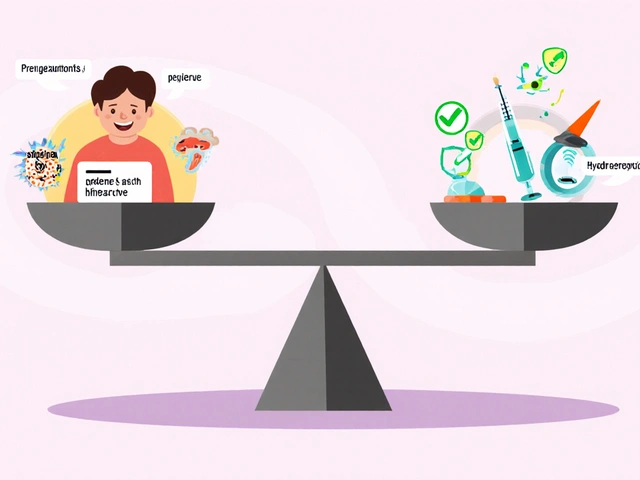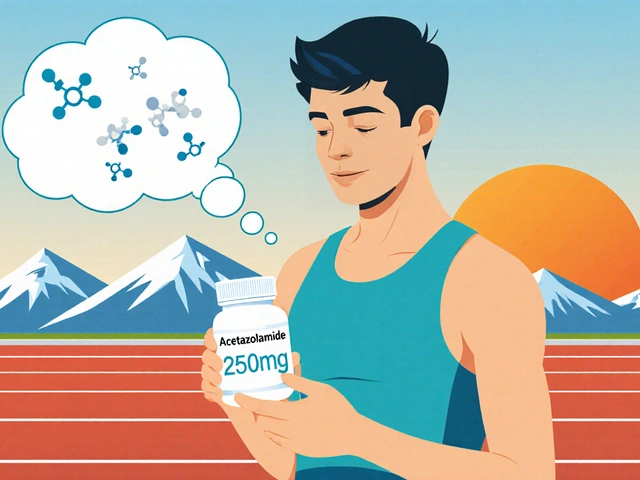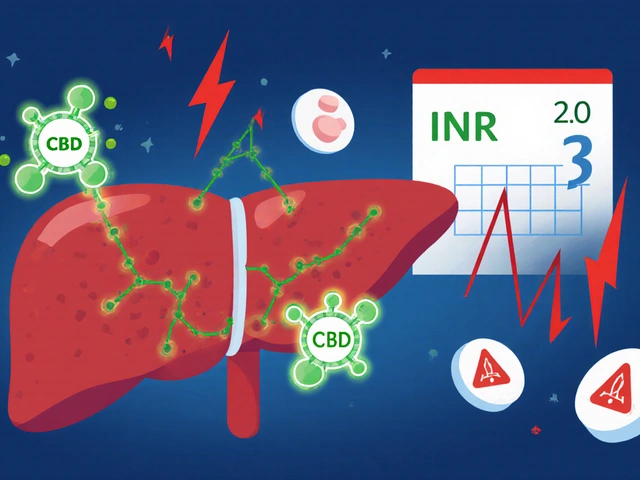Sleep & Digestion Tracker
Track how your sleep affects your stomach health. Enter your details below to see personalized insights.
Quick Take
- Quality sleep supports the Gut Microbiome and keeps stomach acid in check.
- Poor sleep increases stress hormones like Cortisol, which can trigger nausea, heartburn and IBS flare‑ups.
- Aim for 7‑9 hours of uninterrupted sleep to give your digestive system a nightly reset.
- Simple sleep‑hygiene tweaks-dark room, cool temperature, consistent bedtime-can cut the frequency of an upset stomach.
- If stomach pain persists despite better rest, it’s time to see a clinician; chronic issues may signal deeper conditions.
How Sleep Talks to Your Digestive System
When you finally close your eyes, Sleep starts to work on dozens of bodily systems. One of the less obvious partners is the Stomach, a muscular sac that churns food, mixes it with gastric acid, and pushes the partially digested slurry into the small intestine.
During the deeper stages of sleep, the body shifts into a restorative mode. Blood flow redirects from peripheral muscles toward the gut, allowing the lining to repair micro‑tears that everyday chewing can cause. At the same time, the Circadian Rhythm synchronises the release of digestive enzymes, bile, and hormones such as Ghrelin (the hunger‑stimulating hormone) and Melatonin, which not only signals darkness to the brain but also helps the gut slow its motility for optimal nutrient absorption.
Meanwhile, the Gut Microbiome-the community of trillions of bacteria living in the intestines-gets its own nightly reboot. Sleep deprivation skews the balance toward “bad” bacteria, reducing short‑chain fatty acid production that normally protects the gut lining. In short, a solid night’s rest is a nightly maintenance crew for the whole digestive highway.
Stomach Problems That Spike When You Skimp on Rest
Research consistently links poor sleep with several common upset‑stomach symptoms:
- Acid reflux: Lack of sleep raises intra‑abdominal pressure and weakens the lower esophageal sphincter, letting acid splash upward.
- Nausea and vomiting: Disrupted melatonin cycles can upset the brain‑gut axis, making the brain misinterpret signals from the stomach.
- Irritable Bowel Syndrome (IBS) flare‑ups: Elevated Cortisol levels heighten gut sensitivity, turning normal gas and bloating into painful cramps.
- Functional dyspepsia: Sleep loss impairs gastric emptying, so food sits longer in the stomach, creating a feeling of fullness and discomfort.
- Constipation: The gut’s peristaltic waves slow down when you’re chronically sleep‑deprived, leading to harder stools and straining.
Even a single night of 4‑hour sleep can raise the odds of heartburn by roughly 30% according to a 2023 sleep‑gastro study from the University of Leeds.

Using Sleep as a Preventive Shield
Turning sleep into a proactive health habit doesn’t require a complete lifestyle overhaul. Small, consistent adjustments can dramatically lower the risk of an upset stomach.
- Set a bedtime window: Aim for the same start time each night, even on weekends. Your Circadian Rhythm thrives on predictability.
- Control the bedroom environment: Dark curtains, a temperature around 18°C (65°F), and white‑noise machines minimise disruptions that trigger cortisol spikes.
- Limit caffeine and alcohol after 4p.m.: Both substances suppress melatonin production and can increase stomach acidity.
- Finish big meals at least 3hours before bed: This gives the stomach time to empty, reducing pressure that can force acid upward.
- Include a light snack with tryptophan (e.g., a small banana or a handful of almonds) if you’re hungry; tryptophan fuels melatonin synthesis without overloading the gut.
- Practice relaxation techniques-deep breathing, gentle yoga, or a short meditation-right before lights‑out to curb the cortisol surge.
Following these steps consistently can cut nightly acid reflux episodes by up to 40% and improve overall gut motility, according to a 2024 meta‑analysis in the Journal of Sleep Medicine.
Sleep as Part of the Treatment Plan for an Upset Stomach
If you’re already dealing with stomach pain, improving sleep can accelerate recovery. Here’s how to weave rest into a therapeutic routine:
- Implement a wind‑down ritual: Dim the lights 30minutes before bed, switch off screens, and sip a warm herbal tea (ginger or chamomile) that soothes both the gut and the nervous system.
- Use a “sleep‑friendly” position: Elevate the head of the bed by 6‑10cm (2‑4in) to reduce reflux. This simple tilt uses gravity to keep acid where it belongs.
- Track sleep quality: Wear a basic fitness tracker or use a sleep‑monitoring app that gives you data on total sleep time, deep‑sleep percentage, and night‑time awakenings. Spotting patterns can help you tweak habits.
- Supplement wisely: If you struggle to fall asleep, low‑dose melatonin (0.5mg) taken 30minutes before bedtime can restore the hormone’s nightly surge without causing dependency.
- Stay hydrated, but smart: Drink enough water throughout the day, but limit large volumes right before bed to prevent a full‑bladder night‑time wake‑up that can trigger stress‑related stomach spasms.
Clinical trials on patients with functional dyspepsia showed that a 2‑week sleep‑improvement program reduced bloating scores by 22% compared with diet changes alone.
Foods and Habits That Support Both Sleep and Gut Health
What you eat before bedtime can either amplify or dampen the healing power of sleep.
| Food | Key Nutrient | How It Helps |
|---|---|---|
| Greek yogurt | Probiotics | Balances Gut Microbiome, promotes deeper sleep. |
| Oatmeal | Complex carbs & melatonin precursors | Steadies blood sugar, encourages serotonin conversion to melatonin. |
| Banana | Magnesium & tryptophan | Relaxes muscles, supports melatonin synthesis. |
| Chamomile tea | Apigenin | Acts as a mild sedative and reduces gastric inflammation. |
| Almonds | Healthy fats | Keeps stomach lining lubricated, prevents midnight hunger pangs. |
Pair these foods with a low‑acid, low‑fat snack to avoid triggering reflux. Also, keep a short diary of what you ate, when you ate it, and any sleep disturbances; patterns often emerge that you can correct.
When to Seek Professional Help
While better sleep can fix many minor stomach annoyances, some signs demand a doctor’s eye:
- Bleeding from the mouth or rectum.
- Sudden, severe weight loss (>5% in a month).
- Pain that wakes you up at night and doesn’t improve with rest.
- Persistent vomiting or inability to keep fluids down for more than 48hours.
- Chronic diarrhea lasting over three weeks.
If any of these appear, schedule a check‑up. A gastroenterologist can run endoscopy, H.pylori testing, or motility studies to rule out ulcers, infections, or structural issues.

Frequently Asked Questions
Can a short nap reduce stomach acid reflux?
A brief 20‑minute nap can lower stress hormones, which may temporarily lessen reflux. However, napping right after a big meal can increase intra‑abdominal pressure, so keep it light and avoid lying flat.
Is it better to go to bed hungry or slightly full?
A light snack that contains protein or a small amount of complex carbs is best. It prevents a drop in blood sugar that can cause night‑time cortisol spikes, and it doesn’t overload the stomach enough to trigger acid production.
How many hours of sleep do I need to protect my gut?
Most adults benefit from 7‑9 hours of continuous sleep. Below 6 hours, the gut‑brain axis shows measurable inflammation; above 9 hours, benefits plateau and may even signal underlying health issues.
Do sleep aids like melatonin affect digestion?
Low‑dose melatonin generally supports both sleep and gut motility. High doses can occasionally cause mild nausea, so start with 0.5mg and monitor how your stomach feels.
Can stress‑reduction techniques improve my stomach issues?
Absolutely. Practices like mindfulness breathing lower Cortisol, which in turn reduces gut inflammation and spasm frequency.



 Medications
Medications





John Vallee
September 30, 2025 AT 15:33When you finally drift off, your gut gets a backstage pass to the nightly repair crew, and let me tell you, it’s a show you don’t want to miss. The deeper stages of sleep act like a reset button for the microbiome, letting good bacteria repopulate while the bad guys take a hike. Meanwhile, cortisol levels plunge, which means the stomach lining can calm down and stop sending out distress signals. If you’ve ever woken up with that gnawing heartburn feeling, it’s often the result of your body still being stuck in a fight‑or‑flight mode that never got the memo to chill. That’s why the advice to keep a consistent bedtime is more than just a lifestyle tip; it’s a biochemical necessity. A solid 7‑9 hours lets the lower esophageal sphincter regain its strength, keeping acid where it belongs. Poor sleep, on the other hand, raises intra‑abdominal pressure, turning your stomach into a pressure cooker ready to explode with reflux. Think of it like a traffic jam: when the night shift crew is missing, the digestive highway gets clogged and accidents happen. Even a single night of 4‑hour sleep can spike your odds of heartburn by roughly 30 percent, according to recent studies. On the flip side, a well‑rested gut can improve peristalsis, meaning food moves through more smoothly and you’re less likely to feel that bloated heaviness. The hormone melatonin isn’t just for making you sleepy; it also slows gut motility just enough to let nutrients soak in without overwhelming the system. Adding a light snack with tryptophan before bed, like a banana or a handful of almonds, can boost melatonin production without overloading your stomach. And let’s not forget the power of a dark, cool room – that environment tells your brain to crank up melatonin while telling your gut to chill out. So, if you’re battling IBS flare‑ups, try looking at your sleep hygiene first; the medicine might be as simple as a better pillow. Finally, track your sleep patterns with an app or wearable; seeing the data can help you pinpoint when a restless night leads to the next day’s cramps. In short, sleep isn’t just a luxury; it’s the gut’s nightly guardians, and neglecting it is like leaving the front door wide open for digestive trouble.
Brian Davis
October 12, 2025 AT 20:41From the bustling night markets of Bangkok to the quiet tea ceremonies of Kyoto, cultures worldwide have long recognized the tie between rest and digestion, even if they didn’t have the word "microbiome" on their tongues. In Mediterranean households, the siesta isn’t just a break; it’s a strategic pause allowing the digestive system to process the heavy lunch of olive‑oil‑laden fare without the stress of a full afternoon schedule. Meanwhile, Scandinavian countries champion the concept of "fika," a coffee‑and‑pastry ritual that, when paired with a brief, purposeful rest, can actually smooth out blood‑sugar spikes and ease gastrointestinal irritation. In the Indian subcontinent, the practice of ending the day with a warm cup of ginger‑spiced milk not only soothes the throat but also prepares the stomach for the night’s restorative processes by stimulating gentle peristalsis. All these traditions share a common thread: they embed intentional downtime into daily life, acknowledging that the digestive tract thrives when the nervous system is in a parasympathetic state. Modern science now backs these age‑old habits, showing that controlled, consistent sleep windows help reset the gut‑brain axis, balance cortisol, and promote healthier gut flora. So when you hear advice about "going to bed at the same time," remember it’s a wisdom that has been practiced across continents for centuries, long before the era of sleep‑tracking apps.
jenni williams
October 25, 2025 AT 01:50Totally love the tips, thanks! :)
Kevin Galligan
November 6, 2025 AT 05:59Wow, an interactive sleep‑digestion tracker? Because obviously the best way to cure gastritis is to stare at a flashing button and hope the JavaScript does the heavy lifting for you. 🙃
Dileep Jha
November 18, 2025 AT 11:07While the layman’s narrative glorifies REM cycles, the true underpinning lies in the intricate interplay of the hypothalamic‑pituitary‑adrenal (HPA) axis and the enteric nervous system (ENS), a nexus often glossed over in popular health blogs. One must consider the allostatic load imposed by chronic sleep fragmentation, which precipitates dysbiosis via altered circadian expression of antimicrobial peptides. Moreover, the pharmacokinetics of melatonin supplementation become a function of hepatic cytochrome P450 activity, which itself is modulated by gut‑derived short‑chain fatty acids. In short, without addressing the proteomic fluctuations in the microbiome‑derived metabolome, any superficial sleep‑hygiene tweak remains a Band‑Aid on a systemic pathology.
Michael Dennis
November 30, 2025 AT 16:16Interesting points, Dileep. However, the claim that melatonin’s pharmacokinetics are heavily dependent on CYP450 activity isn’t universally supported; most oral low‑dose formulations bypass significant first‑pass metabolism, rendering the impact on gut‑derived metabolites negligible for the average user.
Blair Robertshaw
December 12, 2025 AT 21:24lol u sound like a walking textbook, Dileep. just keep it simple: get sleep, stop overeating at night, and maybe stop reading sci‑fi papers before bed.
Alec Maley
December 25, 2025 AT 02:33I’ve actually tried the head‑tilt trick – raising the pillow by a couple of inches – and it made a noticeable difference in my nocturnal reflux. Combine that with a chamomile tea before lights‑out, and you get a pretty solid “anti‑acid” combo without any meds.
Navjot Ghotra
January 6, 2026 AT 07:41good advice but i think its overrated
Claus Rossler
January 18, 2026 AT 12:50While the article extols the virtues of a regular sleep schedule, it omits the nuance that for shift workers the concept of “regular” is a relative term. Chronobiologists argue that aligning sleep windows with one’s intrinsic circadian phase, as measured by dim light melatonin onset (DLMO), yields superior gut outcomes compared to merely imposing a fixed clock‑time. Therefore, a one‑size‑fits‑all prescription is, at best, a pedagogical convenience and, at worst, a source of frustration for those whose occupational demands clash with traditional diurnal patterns.
chris mattox
January 30, 2026 AT 17:59Great insight, Claus! 🌈 In my experience coaching night‑shift nurses, we’ve found that using a portable light‑therapy box upon waking and dimming lights an hour before sleep can gently shift the DLMO, allowing their gut rhythms to sync up better despite odd hours.
Jackson Whicker
February 11, 2026 AT 23:07Ah, the age‑old dilemma: you’re desperate for sleep, yet your stomach stages a rebellion every time you try to close your eyes. It’s almost poetic, isn’t it? The very organ that should be quietly processing the day’s meals decides to throw a midnight party, complete with acid fireworks.